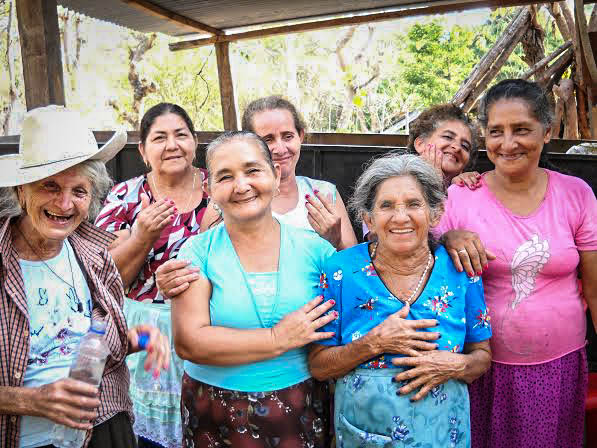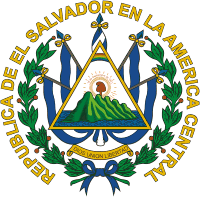
Front row left to right: María Ramirez, María Gregoria (Goyita) Aleman, Manuela de Jesus (Chungita) Santamaria.
Back row left to right: Santana Villalobos, Pacita Hernandez, Hilda Calles, Victoria Hernandez.
The women were clowning around which they tend to do when they have time away from all their responsibilities. Mary Lou Sproul, an Hermana from Spokane sent a picture to the women in Huisisilapa (Huisi) of herself all painted up for Halloween, blue lipstick, blue hair and nails. One of the women suggested that they do the same. Having never painted their nails or worn eye shadow or lip stick in their lives, it was an afternoon of hilarity when one of the daughters fixed them up. Maria decided to dress up as a dirty old man rather than a glitzy woman. They didn’t go anywhere. In fact some of them would not even be seen on the street to go home “painted up” but we all had lots of laughs.
These seven women are leaders in the village of Huisisilapa, San Pablo Tacachico, Dept La Libertad, San Salvador, Central America. It was because of the openness of these women, Hermanas Spokane has had a 12 year solidarity with them and the community. They had never hosted an international person in their humble homes until Phyllis Andersen asked them to tell their stories and Hilda agreed to host Phyllis while living in the village, conducting interviews and observing daily life. These 7 women agreed to be participants in Phyllis’ study to look at the change of consciousness from pre-civil war to post civil war. They were all over the age of 30 when the war began so they had well experienced life.
The study of these women’s lives resulted in a dissertation for Phyllis Andersen, Ph.D. called Life Stories and the Change of Consciousness of Seven Rural Salvadoran Women, 2006. These seven women not only changed their lives but mine and my daughter’s as well. They are open, caring, smart and pragmatic. Even though they have little or no formal education I quickly recognized their skills and capabilities. I respect them highly for the “smarts.” Hermanas Spokane has adopted these women as equals and have been in solidarity with the community for 12 years.
All of the women shared that what they wanted most for their children and grandchildren was an education. The community as a whole has been very active in providing educational opportunities in the village. In 2006 the teachers and community leaders started a high school program with volunteer teachers. They borrowed old curriculum materials from a neighboring high school and began without any support from the Ministry of Education in El Salvador. With the help of “solidarity Spokane,” a group of young people, their parents and Hermanas Spokane, overcame the many obstacles the Ministry of Education put before them. Four years later with the insistence of community leaders, personnel from the Ministry of Education went to visit the school. They were very impressed with what the community had accomplished and accredited the high school.
The next educational goal in the community is to build a library. Also many families who have visited Huisi throughout the years are supporting young people who have completed their high school education in Huisi and have gone on to university studies. Four young people from the first graduating class in Huisi will finish their university degrees in 2014.. A huge feat as they not only had to overcome a lack of books and education materials and supplies but they faced a lot of prejudice in the city. Their living situation in the city is appalling but they make it work with the little they have. We are so proud of them!


